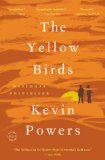Reading Guide Questions

Please be aware that this discussion guide will contain spoilers!
- Discuss the title, The Yellow Birds, and the U.S. Army
marching cadence that inspired it. What does the ca-
dence mean to you? How does the cadence and the title
influence your reading of the book?
- John Bartle and Daniel Murphy first meet when Sergeant Sterling orders them to work as a team. From that moment on, they spend every minute together. How does their relationship evolve, and how is it shaped by the war? In what ways do you read The Yellow Birds as a novel about friendship?
- The story unfolds in a nonlinear narrative, with scenes alternating between Bartle's time as a soldier at war and Bartle's time as a veteran. What effect do you think this structure achieves? Is the story better told this way than chronologically? Why or why not?
- When Bartle returns home, the first person he sees is his mother. How has their relationship changed, and why? What does Bartle's experience reveal about the effect of the war on veterans' families?
- Bartle believes that cowardice is what motivated him to join the military; he also believes it's what prevents him from becoming a man. When in the novel is Bartle truly a coward, and when is he truly brave? How do you think his notions of cowardice evolve or change throughout the book? And how are they intertwined with his feelings of guilt?
- "Nothing seemed more natural than someone getting
killed," Bartle thinks early on in The Yellow Birds. What
do you make of his attitude toward death and how it evolves through the course of the novel?
- When thinking about the letter he writes to Murphy's mother, Bartle reflects, "If writing it was wrong, then I was wrong. If writing it was not wrong, enough of what I'd done had been wrong and I would accept whatever punishment it carried." Why do you think Bartle felt compelled to write the letter? How did it affect Murphy's mother, and how did it affect Bartle? Was it the right decision? Why or why not?
- In an interview, author Kevin Powers said, "If I tried to summarize what I was exploring in the book it would be this: what does it mean to try to be good and fail?" Discuss this question with your group. Have you ever experienced this personally? If so, how did you come to terms with it?
- In reviews, The Yellow Birds has been compared to the
works of great writers of war, such as Ernest Hemingway, Erich Maria Remarque, Wilfred Owen, and Tim O'Brien. In O'Brien's novel The Things They Carried, he writes, "A thing may happen and be a total lie; another thing may not happen and be truer than the truth." Discuss your perspective on the intersection of truth and fiction. What truths do you find in The Yellow Birds? How does your experience of reading fiction about war
differ from your experience of reading nonfiction accounts, such as newspaper articles?
- Discuss the ending of the book and your emotional reaction to it. Do you read the ending as melancholy, hopeful, or both? What do you imagine lies ahead for Bartle?
Unless otherwise stated, this discussion guide is reprinted with the permission of Back Bay Books.
Any page references refer to a USA edition of the book, usually the trade paperback version, and may vary in other editions.

 Book Reviewed by:
Book Reviewed by:


